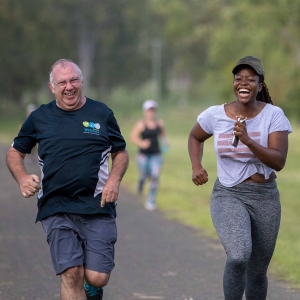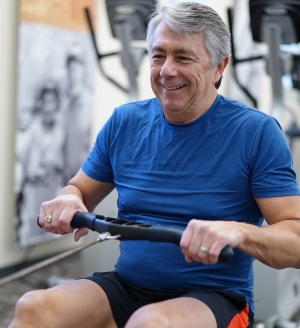Meet the Chair, Dr Gill Cowen
Dr Gill Cowen trained in the United Kingdom (UK), first at Merton College, Oxford University, then Royal Free and University College Medical School, University College, London.
She first fell in love with Australia when she was undertaking her elective at Westmead Children’s Hospital, Sydney, and then at the Fremantle Hospital emergency department and moved to Australia in 2004.
Following completion of her Australian Medical Council examinations, she moved into private general practice and started working as a club doctor in the Western Australian Football League (WAFL).
After gaining her RACGP Fellowship, she split her time between a general practice and a sports medicine practice in the South West region of Western Australia, where she was also the team doctor for WAFL side, Peel Thunder.
Dr Cowen returned to Perth in 2017 and is now a senior lecturer at Curtin Medical School and a sports doctor at SportsMed Murdoch. She is also the Western Australian Football Commission State team doctor for the under 18s and under 16s, and also surgical assistant.
Her considerable career in sports medicine has included being the course doctor for the Etchells’ World Sailing Championships, a match day doctor for Cricket Australia and sports doctor at the Commonwealth Games 2018.
She chairs a multidisciplinary concussion special interest group, teaches early management of severe trauma (EMST) for the Royal Australasian College of Surgeons and regularly gives presentations on behalf of the RACGP.
A truly footy family, her two sons play Auskick and her husband plays AFL Masters. Dr Cowen plays hockey and is a regular gym attendee.
parkrun and social prescribing
 parkrun Australia supports more than 350 communities around the country to deliver free community events in areas of open space every Saturday morning.
parkrun Australia supports more than 350 communities around the country to deliver free community events in areas of open space every Saturday morning.
Each parkrun is a volunteer-led, five-kilometre event that aims to empower everyone in a community to get involved, whether you walk, run, help out or simply be a spectator and socialise in the fresh air. More than 530,000 people in Australia participate.
The events finish at a cafe or meeting place. Everyone is encouraged to stay for a drink and a chat. These non-competitive events reward regular participation, not performance, and are ideal for fostering social connections.
The wide-reaching benefits of parkrun led to the development of a social prescribing initiative with the Royal College of General Practitioners in the UK. This provides general practices with the ability to link with their local parkrun to facilitate patient referrals to parkrun and foster strong links between GPs and the community. In the first year of the program, more than 1,000 ‘parkrun practices’ have been created.
parkrun Australia is exploring the development of a similar program here and is asking Australian GPs to complete its online survey to better understand what Australian-based primary healthcare professionals are doing to refer or signpost people to parkrun.
parkrun Australia-wide networking events
.png.aspx)
RACGP Specific Interests Sport and Exercise Medicine, in conjunction with parkrun, is holding a series of information and networking events across Australia.
Each event will include a presentation from a parkrun representative and a GP (or GPs) who advocate its use.
All events will be held at 6.30–8.30 pm in the following RACGP offices:
*Back pain – The case for whole of community education
.jpg.aspx)
Prof G Lorimer Moseley, Chair in Physiotherapy and Professor of Clinical Neurosciences at the University of South Australia, recently published an editorial opinion in the British Journal of Sports Medicine about the importance of education of patients, health professionals and the public on back pain.
‘Whole of community pain education for back pain. Why does first-line care get almost no attention and what exactly are we waiting for?’ is reproduced in part here:
We have known for decades not to ‘take back pain lying down,’ that the vast majority of back pain episodes do not require surgery or long-term powerful analgesics, and that most will resolve over time if we do not mess them up. So how is it that we are still in this mire of spiralling costs and widespread disability? When are we going to stop taking the very solid science and sensible calls to action just to see it mashed into an accusatory swing at doctors to clean up their act or sufferers to ‘get over it, change their mindset and exercise’?
Back pain is not a simple problem. Many forces at play propagate its widespread mismanagement. The massive elephant in the room – that entire professions appear to depend on the problem remaining unsolved – will be hard to tackle. In the meantime, the glaringly obvious cornerstone of best practice care that somehow keeps flying under the radar is education.
Education is universally recommended as first-line treatment for acute and persistent back pain, but it attracts little attention. Is this because health professionals intuitively know what education is and how to do it? Our research suggests not – most doctors (although there are precious exceptions) do not know what it is, do not know how to do it, do not have the content knowledge and, even if they did, do not have the time. Yet, without education, the rest of best practice care – advice to remain active, to exercise or to seek psychological therapy – makes absolutely no sense. To the person with back pain, best practice care without education looks very much like, ‘we don’t believe you; there is nothing we can do; snap out of it, get back to work and see a shrink.’ It is insulting, illegitimatising and infuriating.
Here is the case for pain education. Contemporary pain education is potentially more powerful for persistent pain than drugs, and as powerful as anything else we can offer. Education is a missing link that would actually make advice to be active, to exercise and to consider psychological therapy a sensible strategy for back pain. Research shows that when someone with persisting pain begins to understand their pain, they actually engage in active, psychologically informed strategies and can have drastic reductions in pain and disability over the next 12 months; for these people, recovery is back on the table.
Moseley GL. Whole of community pain education for back pain. Why does first-line care get almost no attention and what exactly are we waiting for? Br J Sports Med. 2019;53(10):588–589. doi:10.1136/bjsports-2018-099567. (Reproduced under license)
*Sport and exercise medicine in the news

Exercise and cancer
Exercise and Sports Science Australia (ESSA) updated its position statement, Exercise medicine in cancer management. The new recommendations replace the decade-old treatment recommendation for people with cancer to take a ‘slowly, slowly’ approach to exercise with a new guideline recommending personalised exercise programs to achieve the best treatment outcome.
(Queensland University of Technology. New exercise guidelines for people with cancer. 23 May 2019)
A study by researchers from John Hopkins School of Medicine, Cardiorespiratory fitness and incident lung and colorectal cancer in men and women: Results from the Henry Ford Exercise Testing (FIT) cohort, concludes that the fittest adults had the lowest risk of lung and colorectal cancer. Their analysis also linked higher fitness before diagnosis to better survival among people who did develop lung or colorectal cancer.
(Paddock C. Physical fitness might protect against lung and bowel cancers. Medical News Today, 8 May 2019)
The CSIRO recently published findings based on Bettering the Care and Evaluation of Health (BEACH) data describing the frequency of physical activity management (counselling or referrals) by GPs for prostate cancer survivors. It concludes that Australian GPs rarely incorporate physical activity management as part of their management of prostate cancer. Strategies are needed to increase the frequency with which GPs recommend physical activity for prostate cancer survivors.
(Barnes K, Ball L, Galvão DA, Newton RU, Chambers SK, Harrison C. Physical activity counselling and referrals by general practitioners for prostate cancer survivors in Australia. Aust J Prim Health 2019;25(2):152–156. doi:10.1071/PY18131)
IOC World Conference on Prevention and Injury & Illness in Sport – Call for abstracts and workshops

The International Olympic Committee (IOC) World Conference on Prevention and Injury & Illness in Sport will be held in Monaco from Thursday to Saturday 12–14 March 2020.
The scientific committee of this multidisciplinary conference is seeking abstracts for poster sessions and free communications on all fields of prevention research. This includes studies on:
• epidemiology
• risk factors
• injury mechanisms
• pathophysiology
• intervention studies
• relevant biomechanical studies
• studies on sports behaviour and attitudes
• related research from other fields.
Abstracts must be submitted by Sunday 15 September 2019 through the abstract submission portal.
Proposals for interactive discussions or demonstrations can also be submitted. These should be on a topic or issue in sports injury/illness prevention and can be related to practical injury prevention programs, skills or relevant methodological issues.
Proposals must be submitted by Sunday 15 September 2019 through the workshop submission portal.